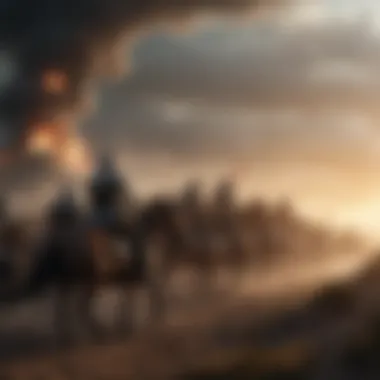Game of Thrones: An In-Depth Exploration of Its Legacy


Intro
The award-winning series, Game of Thrones, epitomizes complexity and ambition in television storytelling. It captivated audiences worldwide through its richly woven narratives, intricate character arcs, and profound themes. This exploration aims to unpack these layers and illuminate the series’ impact on popular culture, narrative form, and character development.
Game of Thrones is based on George R.R. Martin’s A Song of Ice and Fire novels. Its adaptation maintained the core essence of conflicts between power, morality, and survival. From the initial political tides to the evolving dynamics among characters, the series molds a vivid picture of Westeros, a world where no one is truly safe. As we navigate through its multiple seasons, significant awards, and cultural meaning, we start gaining a clearer view of its artistic and philosophical constructs.
The Genesis of Game of Thrones
The creation of Game of Thrones marks a pivotal evolution in contemporary television storytelling. This section sheds light on the foundations of the series, offering insights into its literary origins and the creative vision behind bringing the novels to screen. Understanding these elements enhances appreciation for the bold decisions taken throughout the show and the detailed world-building that captivated millions.
Origins in Literature
Game of Thrones draws heavily from George R.R. Martin’s extensive works, principally his book series A Song of Ice and Fire. Published initially in 1996, the first book set the stage for a complex narrative imbued with rich characters and unexpected plot twists. Martin's impeccable grasp of nuanced storytelling and layered characterizations created compelling dynamics that resonate with audiences.
Fans marvel at how Game of Thrones intertwines various themes including honor, loyalty, and the quest for power within a medieval fantasy setting. This origin not only establishes the elaborate background and lore, but it also impacts character development and decisions that unfold throughout the series. As such, recognizing these literary underpinnings is key for viewers and scholars alike, evolving Game of Thrones into a rich tapestry of character arcs and immersive storytelling.
The Vision of David Benioff and D.
B. Weiss
The adaptation from page to screen required not just any vision, but one that could embrace the narrative's intricate details. David Benioff and D.B. Weiss, tasked with this immense job, were bold. They approached Game of Thrones with a cinematic perspective, prioritizing captivating visual storytelling. The duo judiciously selected key plotlines from Martin's substantial literary works while maintaining alignment with foundational themes.
By tackling each episode with precision, the writers could breathe new life into the rich content of Martin’s books, turning distinct chapters into smoothing viewing experiences.
As they ventured further, their work demonstrated a balance between fidelity to the source material and innovative storytelling. Their influence is evident in plot structures that meld suspense with insightful character exploration, ultimately fostering a loyal fan base that is deeply engaged with unfolding narratives. The combination and melding of literary roots with filmic executions solidify the significance of Benioff and Weiss in shaping Game of Thrones into a limited series, often regarded as a modern TV phenomenon.
"The adaptation of Game of Thrones showcases a marriage of literature and visual artistry that has changed the landscape of television storytelling."
Aesthetic Elements of Production
The aesthetic elements of Game of Thrones play a vital role in crafting the immersive world that has captivated millions. Production design, sets, costumes, and props contribute significantly to the narrative and give viewers a sense of authenticity and depth. These elements enhance storytelling and draw the audience into the complex layers of this fantasy universe.
Set Design and Locations
Set design in Game of Thrones is a fundamental aspect that brings Westeros to life. The choice of real-life locations, combined with constructed sets, creates an intricate and believable environment. The production team harvested a variety of landscapes, from the rugged cliffs of Northern Ireland to the sunlit beaches of Spain. This diversity is essential for establishing the unique characteristics of each region within the series.
Key Factors of Set Design
- Authenticity: Using real locations contributes to a genuine aesthetic that grounds the fantastical elements.
- Isolation: The use of geographically diverse places underscores thematic elements, like isolation and political boundary.
- Detail: Set designers meticulously crafted intricate details, down to the wooden textures of Winterfell or the vibrant colors of King's Landing.
By creating detailed and diverse settings, the audience feels transported into the world of Westeros, facilitating deeper engagement with the story.
Costume and Prop Design
Costume and prop design are equally crucial in establishing character identities and enhanced storytelling. Each costume conveys characteristics that provide insight into social status, role, and personality.
Importance of Costume Design
- Character Depth: Costumes reflect the characters’ journeys, with changes in attire symbolizing personal transformation or societal status. For example, Daenerys Targaryen's evolving wardrobe mirrors her growth from a young, vulnerable woman to a powerful leader.
- Visual Storytelling: Creative use of design enhances thematic elements, from the battle outfits of the Stark family—practical and functional—to the opulent gowns worn by Cersei Lannister that signify her status and ambition.
The props used throughout the series also underscore significant plot points. Notably, iconic items such as Jon Snow's sword, Longclaw, carry heavy symbolic weight beyond their immediate functional purposes.
Effectiveness through Design


Successful costumes and props do more than display visual appeal, they deepen narrative complexities and emotional connections to characters.
Character Development: A Study
Character development forms a core aspect of Game of Thrones. It is a vital expresssion of the show’s multy-layered narrative, allowing viewers to connect witth the mistakes and successes of both protagonists and antagonists. This in-depth dive into character arcs not only enhances our understanding of the story's themes but also deepens emotional investment in the series.
The characters often change in surpriseing ways, portraying the complexities of human nature. Their motivations, desires, an flaws create a rich tapestry that drives the story foreard. Meaning within the series stems from interactions and conflicts among characters, and is pivotal to both the development of drama and the foundational themes of power and morality.
Protagonists and Antagonists
In Game of Thrones, the line between protagonist and antonist is blurred, complicating typical narrative roles. Characters like Jon Snow and Daenerys Targaryen surface as potential heroes, yet they embody characteristics flaws that pose moral questions. Jon is admirable for his sense of honor but frequently faces dilemmas that complicate his man's nature. Daenerys, who starts her journey seeking justice and freedom, encounters corruption power brings as she introduces violence and coercion in her quest.
Themes Explored in the Series
The exploration of themes in Game of Thrones is crucial to understanding its complex narrative and character motivations. These themes provide depth, allowing the show to resonate with both casual viewers and dedicated fans. By grappling with topics like power, honor, and betrayal, the series invites audiences to reflect on the human condition, making its storylines profoundly relevant.
Power and Betrayal
One of the central themes in Game of Thrones is power and betrayal. The quest for dominance drives multiple characters and factions. From the treacherous politics of King's Landing to the icy walls of Winterfell, characters engage in schemes that reveal their desires and weaknesses. Power is not merely a tool but a dangerous coin, often leading to situations where betrayal is almost inevitable.
Winners in this brutal game apply manipulation and duplicity. For example, the Machiavellian tactics of Petyr Baelish, also known as Littlefinger, illustrate the lengths individuals will go to accumulate influence. His strategic betrayal of characters like Ned Stark exposes a relentless world. In stark contrast, sincere characters like Jon Snow grapple with the harsh realities of betrayal, exemplifying the ongoing battle between honor and ambition.
This theme resonates on various levels. The morally gray universe of Westeros impels viewers to question their perceptions of right and wrong. Understanding these various dimensions of power and betrayal provides insight into human characteristics, establishing a baseline of moral complexity not often portrayed in mainstream television.
Honor in Conflict
Honor plays a significant role amid the chaos depicted in Game of Thrones. Different characters embody varying interpretations of honor, reflecting broader ideological bases. The noble Stark family, for instance, prioritizes honor, standing firm on moral grounds. In contrast, other characters often shift their allegiances based on convenience and advantage, exposing differing ethical frameworks.
The contrast between characters adhering to a code of honor versus those who flexible moral boundaries enhances thematic richness. When noble decisions lead to downfall, it compels viewers to consider the price of integrity. For instance, Ned Stark’s commitment to his principles ultimately costs him dearly, symbolizing the show’s harsh judgment on naive idealism.
Honor in the context of conflict often explores the implications of loyalty, betrayal, and sacrifice. Characters face dilemmas that challenge their values, creating intense emotional and psychological stakes that amplify the drama. This theme encourages the audience to reflect on personal beliefs and situations where they, too, must navigate precarious moral landscapes.
In summary, themes such as power and betrayal and honor in conflict are not mere embellishments in Game of Thrones. They serve as vessels that carry critical messages and engage the audience in deeper philosophical conversations about real-life issues, societal constructs, and the darkest corners of human ambition.
Awards and Recognition
The significance of Awards and Recognition for Game of Thrones cannot be overemphasized. It represents a validation of the teamwork and artistic expression put forth by the cast, crew, and writers. Awards highlight excellence, fostering a deeper appreciation among viewers for the efforts spent creating the series. Furthermore, accolades like the Emmy Awards serve to mirror the show's impact on television history, showcasing how Game of Thrones redefined narrative possibilities and audience expectations. In this section, we focus on its Emmy triumphs and other notable recognitions, unraveling how these awards contribute to the series' legacy.
Emmy Awards Achievements
Game of Thrones stands out remarkably at the Emmy Awards. The series accumulated a total of 59 Emmy Awards, more than any other scripted television series, underscoring its monumental influence over the television landscape.
- Outstanding Drama Series: Game of Thrones won this prestigious award multiple times during its run, underscoring its status as a benchmark in quality storytelling and production.
- Acting Awards: The performances were lauded, resulting in wins for various casts, including Peter Dinklage, who won four times in the category of Outstanding Supporting Actor in a Drama Series.
- Technical Achievements: Its accomplishments extend into various technical categories such as Outstanding Production Design, Outstanding Sound Editing, and Outstanding Special Visual Effects. Each award recognition highlights the intricate level of detail and attentivenes in production, making its world feel vivid and immersive.
The constant recognition is not merely validation; it sets benchmarks for forthcoming series. Game of Thrones redefined audience expectations in terms of storytelling depth, character complexity, and production quality.
Other Notable Awards
Beyond the Emmy Awards, Game of Thrones received numerous other distinctions that amplified its prestige in popular culture.
- Golden Globe Awards: It secured wins for categories like Best Television Series – Drama, solidifying its acclaim within the more extensive television community.
- Screen Actors Guild Awards: The cast gained honors at these awards, reflecting peer recognition and appreciation of their performances.
- Producers Guild of America Awards: Honored as Outstanding Producer of Live Entertainment & Talk Television, showcasing Game of Thrones accomplishments in live production as well.
Many of these recognitions emphasize its influence not just during its airing but also its lasting effect. Game of Thrones opened avenues for narratives previously deemed complex for television, paving the way for an era where cinematic storytelling merges increasingly with television formats.
By scrutinizing the extensive collection of awards, we gain insight into the intricacies that hold viewers captive, illuminating the high standards set by books, plots, and direction throughout the series.


Impact on Popular Culture
The impact of Game of Thrones on popular culture is profound and multifaceted. The series not only captured a vast audience but also inspired widespread discussions and analyses among fans and critics alike. Its influence transcends mere viewership; it has become a cultural phenomenon that sparked trends in storytelling, production values, and audience expectations in television.
One particular aspect worth noting is its ability to generate significant merchandising opportunities. Various products, from action figures to clothing, allow fans to engage with the show beyond just watching. This expanded the series' reach and solidified its place in the market. Moreover, HBO capitalized on this popularity to create a range of spin-offs, further exploring the expansive lore developed throughout the show.
Popularity also manifests in social media discussions. Fans frequently share theories, artwork, and memes that reflect the series' narratives and characters. This engagement nurtures a community of enthusiasts, transforming content consumption into participation.
In summary, the impact of Game of Thrones on popular culture extends far beyond its airings. The series is a fundamental catalyst that reshaped television in many ways.
Merchandising and Spin-offs
Merchandising related to Game of Thrones represents a lucrative and impactful sector. From collectible figurines and DVDs to board games, the merchandise showcases the deep engagement of fans with the show's intricate world. Companies like Hasbro and Funko have produced various products that celebrate iconic characters and symbols, from House Stark to Daenerys Targaryen.
HBO recognized the potential of spin-offs right from the series' peak popularity. Several prequel series are in the pipeline, intending to exploit different narrative arcs and history from the expansive A Song of Ice and Fire universe. Notable future projects, like House of the Dragon, focus on rich backstories and central themes seen throughout the original series. These spin-offs aim to maintain engagement with existing fans while drawing in new audiences.
Overall, the merchandising and spin-offs of Game of Thrones have sustained its legacy, enabling continued conversations about the series and its universe long after the end of the main storyline.
Influence on Other Television Shows
The influence of Game of Thrones on the television landscape is indisputable. It led to new standards for production quality, storytelling techniques, and even narrative complexity. Following its acclaimed first season, many shows sought to replicate its success by weaving intricate story arcs blended with deep character development.
One notable example is The Witcher, which combines fantasy elements with character-driven plots in a manner reminiscent of Game of Thrones. Similarly, series like Vikings and The Last Kingdom show trends in ambitious storytelling and the gritty, realistic portrayal of historical narratives.
Furthermore, the success of Game of Thrones has evidently opened the door for more long-form storytelling in television. Networks and streaming services capitalize on the mix of depth and compelling storytelling. It has sincerely reshaped audience expectations. Viewers now anticipate long, complex stories where character motivations drive plot evolution rather than predictable memorabilia structures.
Narrative Structure of Game of Thrones
The narrative structure within Game of Thrones holds a fundamental place in understanding the show's significance. This series does not follow a straight line but rather weaves intersecting paths through its multiple characters and expansive world. The complexity of the narrative engages viewers, ensuring that each episode contributes to an overarching tapestry of intrigue and suspense. This structure elucidates various perspectives, allowing audiences to become more immersed in the intricate tale of Westeros.
Story Arcs and Pacing
Throughout its seasons, Game of Thrones masterfully explores various story arcs, each layered with depth and character growth. The show gives life to multiple overlapping narratives, such as the Stark family's tribulations, the formidable rise of Daenerys Targaryen, and the crafty maneuvers of the Lannisters. Each arc presents not only individual motivations but also how these motivations intersect and collide.
The pacing within these arcs effectively builds tension. It oscillates between slow-burning moments of character development and adrenaline-pumping action scenes. Such intentional pacing results in clever cliffhangers that leave the audience eager for the next installment. Series like this realize the value in the impact of having to wait for resolutions. A judicious buildup over several episodes keeps stories engaging and fortifies emotional stakes.
Climactic Endings and Revelations
Game of Thrones is renowned for its climactic endings and well-placed revelations that often recontextualize previous events. The culmination of key arcs reveals unexpected alliances and shocking betrayals. These climaxes resonate, ensuring audiences reflect on what just unfolded long after the credits roll.
Notable instances are often viewed in hindsight. For example, the revelation about Jon Snow's parentage becomes a crucial pivot, changing how viewers perceive his journey through the series. Momentous episodes are often punctuated with pivotal scenes that force characters to either evolve, make difficult choices, or meet their inevitable fates.
"In retrospect, every revelation serves not only to shock but also to tie broader thematic concepts together, reflecting the unstable nature of power and trust."
Over time, the series promotes a savvy interplay between buildup and payoff that caters to an attentive audience. These surprising twists resonate with the art of storytelling at its core, embodying a strategy that enriches both characters and viewer experience. As a result, the series craftily draws its audience into an ever-deepening expanse of this unstable world, compelling them to navigate alongside every character's agonies and triumphs.
The Role of Music and Score
Music is not simply background noise in Game of Thrones; it is an essential component that enhances the storytelling and emotionally engages the audience. The series' score serves to amplify key moments, define characters, and underpin the thematic elements found throughout the narrative. By integrating music thoughtfully with visual and dramatic components, the series creates a rich auditory experience that significantly elevates its storytelling.
Composing the Identity
Ramin Djawadi, the composer behind Game of Thrones, played a crucial role in establishing an auditory identity for the series. His scores are instantly recognizable and evoke specific emotions tied to distinct characters and scenes. Each theme is meticulously crafted to reflect the complexity of the show’s numerous plots and characters.


For example, the iconic Main Title theme employs an uplifting orchestration, which contrasts sharply with the series' often dark narrative. This juxtaposition captures the sprawling epic nature of the story while still conveying an underlying sense of foreboding. The piece has shown to grow alongside the series, adapting as key narratives develop.
In addition, many characters have their own motifs, deserving particular mention. The eerie notes associated with Arya Stark underscore her transformation into a figure of vengeance. In stark contrast, Daenerys Targaryen’s theme incorporates powerful, sweeping melodies symbolizing her quest for power and stability. Such careful composition aids viewers in associating emotions with visual representations onscreen, allowing narrative coherence.
Thematic Resonance through Music
The thematic resonance of music in Game of Thrones goes far beyond aesthetics. It derives meaning from context and shared experiences within the show. Within pivotal moments, the score provides layers of interpretation and depth to character arcs and story elements.
Music highlights critical turning points, helping to clarify motives and symbolize larger ideas, such as loyalty, betrayal, or personal ambition. For instance, during the Red Wedding, the choice of melody juxtaposes festive ideals with horrifying violence, inviting the audience to grapple with irony. Through the resonance of these sounds, viewers ponder broader implications, questioning implications on loyalty and trust within the world of Westeros.
Reception and Legacy of Game of Thrones
The reception and legacy of Game of Thrones are central to its significance as a cultural phenomenon. The series shaped not just the landscape of television but also our understanding of narrative storytelling. Its blend of political intrigue, moral ambivalence, and rich characters taught audiences to expect complexity in their entertainment. This section scrutinizes the critical reception of the show and how it influenced discussions in different spheres.
Audience Response and Criticism
Game of Thrones generated a wide range of audience reactions throughout its run. Initial responses highlighted the brilliant writing and superb character arcs. Viewers were hooked by the unexpected plot twists and dramatic deaths. However, as the final seasons unfolded, some long-time fans expressed discontent. Issues surrounding pacing and character development led to polarized opinions.
Critics pointed out that the last season, in particular, felt rushed. Despite its cinematic quality and production value, many believed it lacked the depth and nuance present in previous seasons.
Interestingly, the disparity in audience reaction can be seen in several key moments:
- The death of major characters sparked both cheers and frustrations.
- The handling of prominent arcs, such as Daenerys Targaryen's transformation, evoked debate about user emotions in storytelling.
The finale received mixed reviews from hardcore fans and casual viewers alike. This split offers a vital lesson on audience expectations and the challenge of concluding a sprawling narrative.
Cultural Dialogues Generated
The cultural impact of Game of Thrones extends far beyond the screen. Sociocultural debates emerged in response to its themes of power, ethics, and vengeance. It became a reference point in discussions around feminism and representation.
The series ignited numerous dialogues:
- Gender Representation: Viewers often dissected the portrayal of women in the series—from Cersei Lannister's cunning ruthlessness to Brienne of Tarth's loyalty and honor.
- Morality and Choices: Characters were rarely fully good or evil. This nuanced portrayal prompted discussions on moral grey areas in society.
The show forced audiences to confront uncomfortable truths about loyalty, survival, and the brutal price of power.
Furthermore, parallels can be drawn between the show's events and modern geopolitical issues. Fans and critics alike noted the series drew lines between epic battles in Westeros and real-world conflicts, consequently reshaping how audiences think about historical narratives.
In summary, the legacy of Game of Thrones stands on a foundation of complex characters, intricate plots, and the often-unpredictable relationship between audience and narrative. The dialogues it sparked continue to hold weight, enriching discussions across generations.
Final Thoughts on HBO's Masterpiece
Game of Thrones remains a significant achievement in modern television history. Its exploration of complex characters, expansive storytelling, and cultural impact are undeniable. This article has laid out key elements that define the series. The importance of understanding its journey cannot be overstated. Reflecting on both the triumphs and missteps offers insights into not just Game of Thrones, but also the very essence of the television medium itself.
Reflecting on Its Journey
From its debut in 2011 to its conclusion in 2019, Game of Thrones transformed television. It started as an ambitious adaptation of George R.R. Martin's A Song of Ice and Fire series. The show combined high production values with deep narrative complexities, drawing audiences in with its unpredictable plotlines and richly developed characters. One cannot ignore the way viewers became emotionally attached to various figures, from Eddard Stark's portrayal of honor to Daenerys Targaryen’s push for power.
Numerous viewing parties and fan discussions throughout the airing should highlight the series' grip on popular culture. Engaging story arcs encouraged online debates and theories, enriching the viewing experience and fostering community among fans. The show even lead to buzzworthy moments like the Red Wedding or the shocking fate of the Night King. Overall, its mid-series peak showed that audiences are searching for substance and unpredictability in storytelling.
Looking Ahead: Future of the Franchise
The conclusion of Game of Thrones may have brought mixed reviews, but the franchise lives on. Spin-off series like House of the Dragon are already in development as fans remain eager for more content. HBO has shown commitment to leveraging the intangible assets of this world. This suggests there may still be much to uncover in Westeros and its diverse factions.
Moreover, the shift in conflict themes from the original show offers interesting possibilities. Challenges such as alliances, old rivalries, and new characters can drive future stories. The legacy of Game of Thrones means that any new narratives will carry the weight of expectations built over eight compelling seasons. At the same time, they also have an opportunity to redefine storytelling in a way that captures both old and new fans alike.
The realm of Game of Thrones remains a fertile ground for creative explorations. Additional content could very well revive and challenge established thoughts surrounding the theme of power and its ultimate cost. Thus, while the show itself has concluded, the conversations surrounding it will continue to evolve alongside any future projects.
"In a world that seemed to prioritize the spotlight, Game of Thrones taught us that darkness lurks beneath the surface."
Game of Thrones is more than just a series. Its impact runs deep within cultural dialogues, highlighting a blend of politics, power, betrayal, and human nature. It envelopes topics that readers can analyze repetitively, leading to a profound understanding long after the final episode aired.



